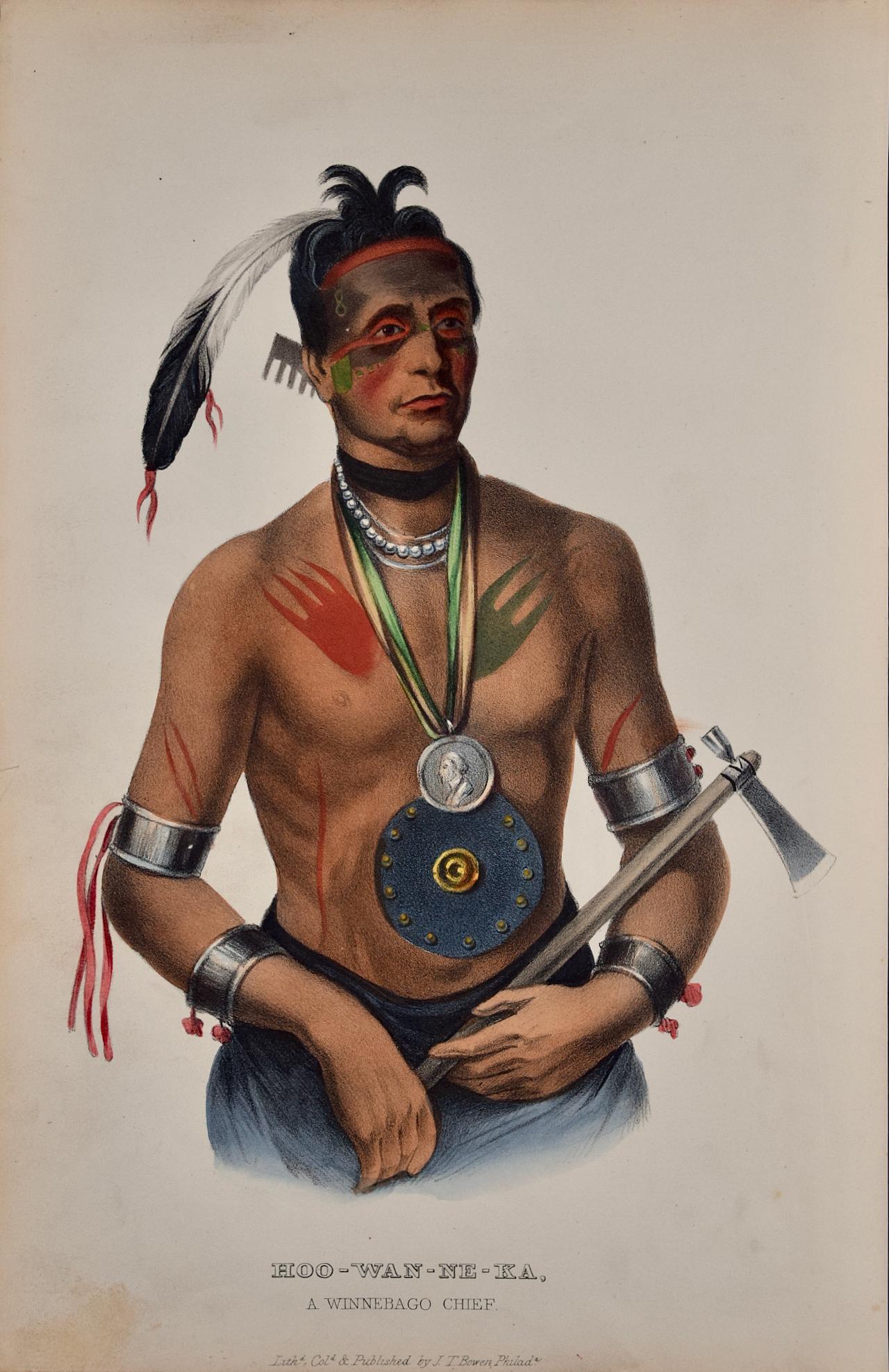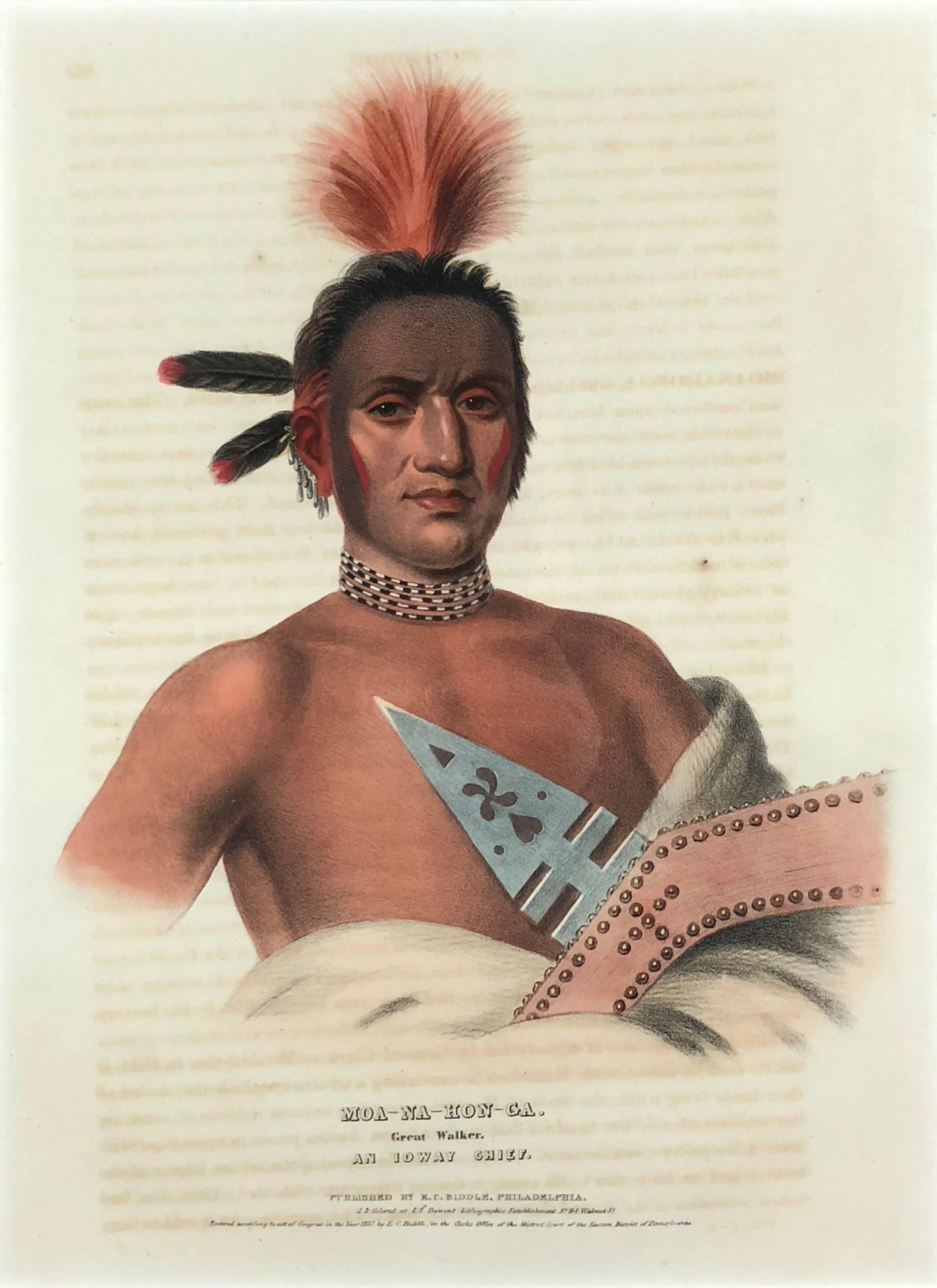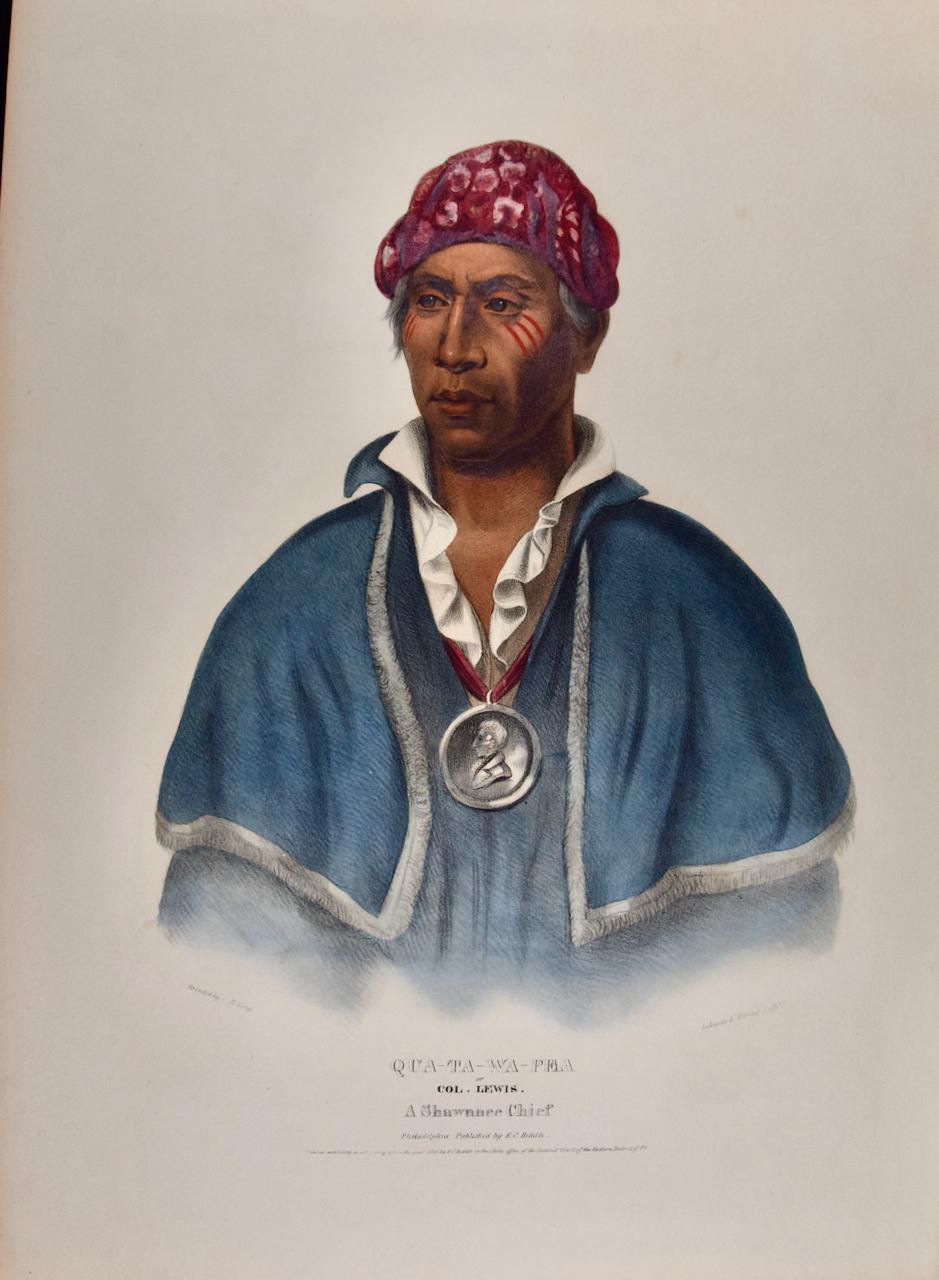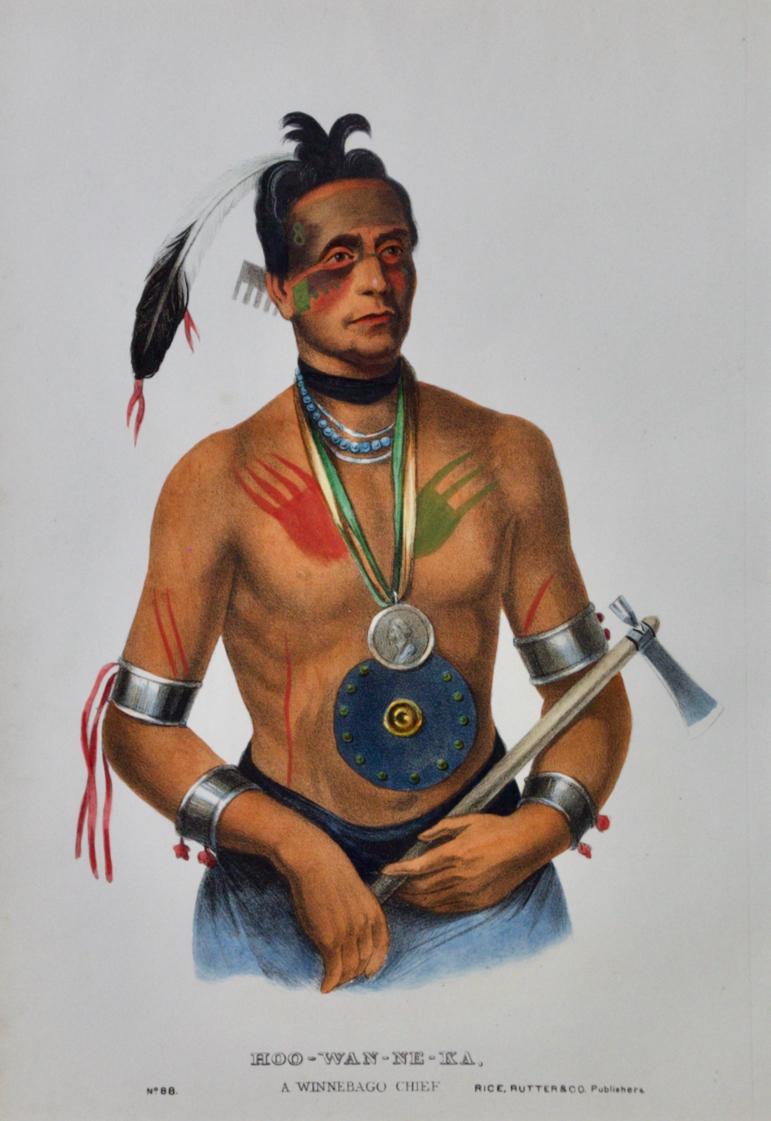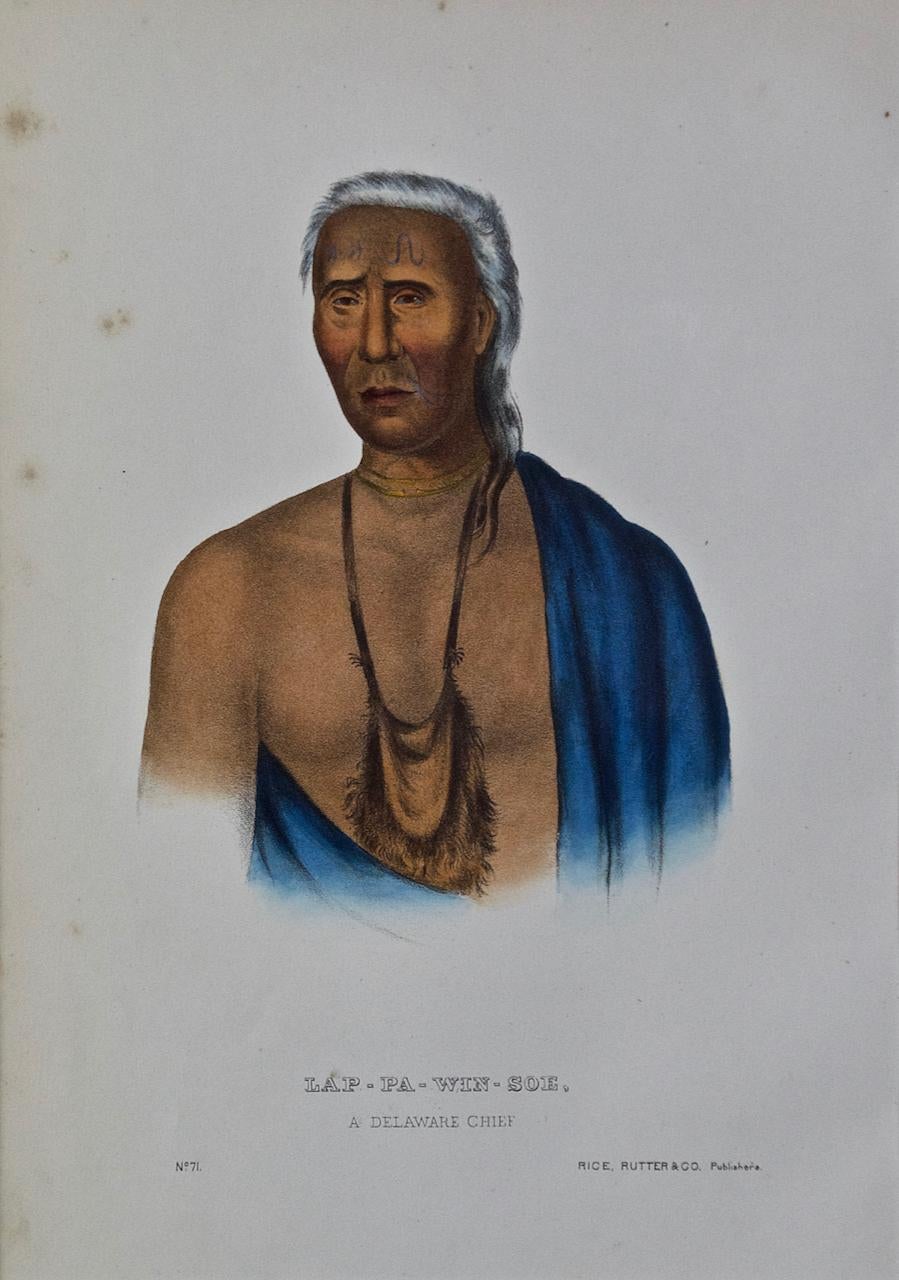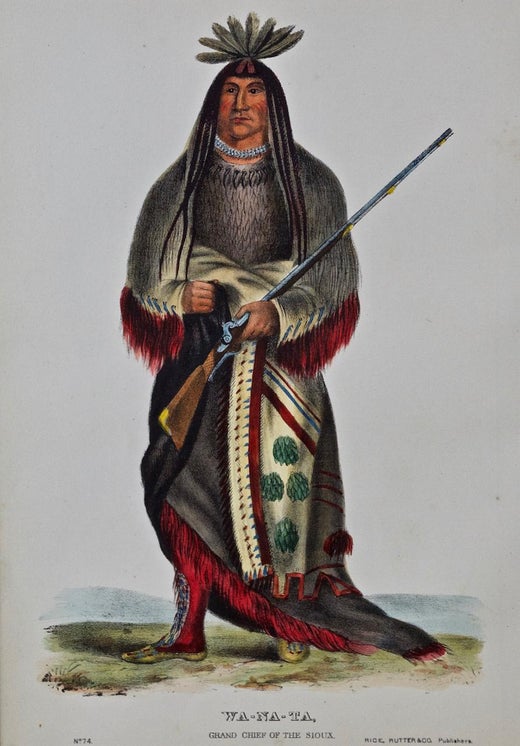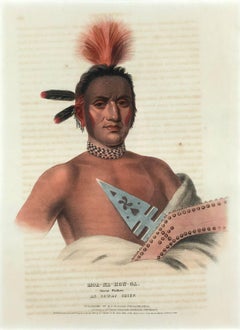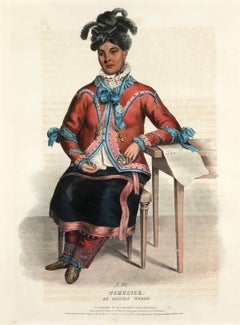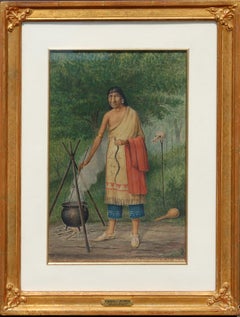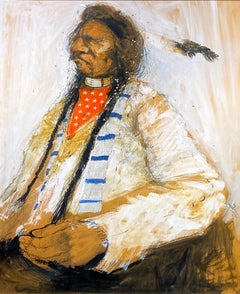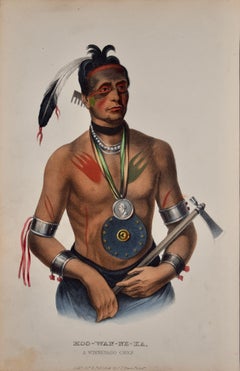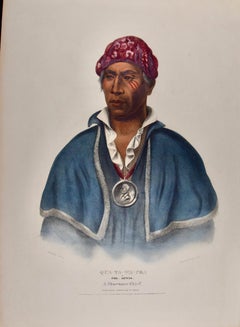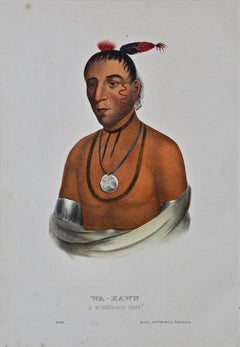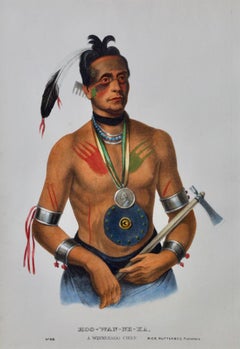Items Similar to Qua-Ta-Wa-Pea or Col. Lewis. A Shawnee Chief.
Want more images or videos?
Request additional images or videos from the seller
1 of 6
McKenney & HallQua-Ta-Wa-Pea or Col. Lewis. A Shawnee Chief.1836
1836
$1,500
£1,143.45
€1,306.30
CA$2,110.71
A$2,311.88
CHF 1,217.21
MX$27,591.56
NOK 15,512.21
SEK 14,180.50
DKK 9,761.55
About the Item
MCKENNEY, Thomas L. (1785-1859) and James HALL (1793-1868)
Qua-Ta-Wa-Pea or Col. Lewis. A Shawnnee Chief.
Philadelphia: E.C. Biddle, 1836. Hand-coloured lithograph. Image size (including text): 14 3/8 x 10 inches. Sheet size: 20 x 14 1/8 inches. Framed size: 24 x 20 3/8
A fine image from McKenney and Hall's 'Indian Tribes of North America': `One of the most important [works] ever published on the American Indians' (Field),` a landmark in American culture' (Horan) and an invaluable contemporary record of a vanished way of life.
A courageous Shawnee chief, Qua-Ta-Wa-Pea, also known as Colonel Lewis, was rumored to have been elected leader because the Shawnee interpreted President Jefferson's act of honoring him with a medal during a post-Revolution visit to Washington as a sign that that was the will of the United States. As was frequently the custom among Indians, Qua-Ta-Wa-Pea adopted the name of a respected white friend, that of Officer John Lewis. The Shawnee, an Algonquin speaking tribe, inhabited the Southeastern region of the United States.
McKenney and Hall's 'Indian Tribes of North America' has long been renowned for its faithful portraits of Native Americans. The portraits are largely based on paintings by the artist Charles Bird King, who was employed by the War Department to paint the Indian delegates visiting Washington D.C., forming the basis of the War Department's Indian Gallery. Most of King's original paintings were subsequently destroyed in a fire at the Smithsonian, and their appearance in McKenney and Hall's magnificent work is thus our only record of the likenesses of many of the most prominent Indian leaders of the nineteenth century. Numbered among King's sitters were Sequoyah, Red Jacket, Major Ridge, Keokuk, and Black Hawk. After six years as Superintendent of Indian Trade, Thomas McKenney had become concerned for the survival of the Western tribes. He had observed unscrupulous individuals taking advantage of the Native Americans for profit, and his vocal warnings about their future prompted his appointment by President Monroe to the Office of Indian Affairs. As first director, McKenney was to improve the administration of Indian programs in various government offices. His first trip was during the summer of 1826 to the Lake Superior area for a treaty with the Chippewa, opening mineral rights on their land. In 1827, he journeyed west again for a treaty with the Chippewa, Menominee , and Winebago in the present state of Michigan. His journeys provided an unparalleled opportunity to become acquainted with Native American tribes. When President Jackson dismissed him from his government post in 1830, McKenney was able to turn more of his attention to his publishing project. Within a few years, he was joined by James Hall, a lawyer who had written extensively about the west. McKenney and Hall saw their work as a way of preserving an accurate visual record of a rapidly disappearing culture. (Gilreath).
Cf. BAL 6934; cf. Bennett p.79; cf. Field 992; cf. Howes M129; cf. Lipperhiede Mc4; cf. Reese, Stamped With A National Character p. 24; Sabin 43410a.
- Creator:
- Creation Year:1836
- Dimensions:Height: 24 in (60.96 cm)Width: 20.38 in (51.77 cm)
- Medium:
- Period:
- Condition:Good overall condition with some foxing.
- Gallery Location:Missouri, MO
- Reference Number:1stDibs: LU74732426093
McKenney & Hall
Col. Thomas J. McKenney was Superintendant of The Bureau of Indian Affairs from 1816 until 1830. He was one of a very few government officials to defend American Indian interests and attempt to preserve their culture. He travelled to Indian lands meeting the Native American leaders. He brought with him an accomplished artist, James Otto Lewis, who sketched those willing to participate. A large number of the most influential Indian chiefs and warriors were later invited to come to Washington in 1821 to meet President Monroe. McKenney commissioned the prominent portrait painter Charles Bird King, who had a studio in the capital, to paint these native American leaders, who chose the costumes they wished to wear for the sitting. The magnificent resultant paintings were displayed in the War Department until 1858, and were then moved to the Smithsonian Institute. When Andrew Jackson dismissed McKenney in 1830, he gave him permission to have the King portraits as well as some by other artists, including George Catlin and James Otto Lewis, copied and made into lithographs, in both folio and octavo sizes. McKenney partnered with James C. Hall, a Cincinnati judge and novelist to publish the lithographs and the text written by Hall. The work was extremely expensive to create and nearly bankrupted McKenney, as well as the two printing firms who invested in its publication. The resultant work gained importance when Catlin's paintings were destroyed in a warehouse fire and Charles Bird King's and James Otto Lewis’ portraits were destroyed in the great Smithsonian Museum fire of 1865. The McKenney and Hall portraits remain the most complete and colorful record of these pre-Civil War Native American leaders.
About the Seller
5.0
Vetted Professional Seller
Every seller passes strict standards for authenticity and reliability
Established in 1970
1stDibs seller since 2017
156 sales on 1stDibs
Typical response time: Several days
- ShippingRetrieving quote...Shipping from: Missouri, MO
- Return Policy
More From This Seller
View AllMoa-Na-Hon-Ga, Great Walker, An Ioway Chief
By McKenney & Hall
Located in Missouri, MO
MOA-NA-HON-GA. GREAT WALKER. AN IOWAY CHIEF., from History of the Indian Tribes of North America
Artist:Charles Bird King
Publisher:McKenney and Hall
hand-colored engraving on paper
...
Category
1830s American Realist Portrait Prints
Materials
Engraving
Tshusick, An Ojibway Woman
By McKenney & Hall
Located in Missouri, MO
Lithograph with original hand color.
Sheet size: 18.5 x 13.25 inches.
Framed Size: 24 x 20 3/8 inches
Date : c. 1836-44
Mckenney and Hall's hand colored lithographs remain some of...
Category
1830s American Realist Portrait Prints
Materials
Lithograph
Medicine Man
By Cassilly Adams
Located in Missouri, MO
Cassilly Adams (American 1843-1921)
"Medicine Man" c. 1860s
Watercolor on Paper
Unsigned
Provenance: Questroyal Gallery, NYC
Site Size: approx. 14.5 x 8....
Category
Mid-19th Century American Realist Figurative Drawings and Watercolors
Materials
Paper, Watercolor
Price Upon Request
Portrait of Victory
By Paul Pletka
Located in Missouri, MO
"Portrait of Victory"
By Paul Pletka (1946- )
Image Size: 30" x 23"
Framed: 42" x 36"
Signed: Lower Right
Paul Pletka is a neo-surrealistic painter inspired by his fascination from early childhood with Native Americans of the Southwest. His style, described as neo-surrealistic, "is both realistic and deeply spiritual, being highly sensitive to the inner thoughts of Native Americans."
Paul Pletka was born in southern California in 1946 and currently resides in New Mexico. After high school, he won a scholarship to Arizona State University and then transferred to Colorado State University, but feeling disappointed in his college art training, did not paint seriously until the late 1960s.
His works of art have been exhibited in one-man shows in Colorado, New Mexico, Arizona, Texas, Illinois, New York, Kansas and Missouri continuously since 1964. Pletka's paintings are in more than 40 private and public art collections including the Albany Museum of Art, Albany, GA; Hallmark Cards, Kansas City, MO; Mel Pfaelzer Collection, University of Northern Illinois, De Kalb; the Norton Gallery & School of Art, West Palm Beach...
Category
20th Century American Modern Mixed Media
Materials
Paper, Mixed Media
Price Upon Request
Napoleon
By Manufacture Nationale de Sèvres
Located in Missouri, MO
Sevres 19th C.
Original Hand Painted Porcelain
Signed "G Poitevin"
approx 9 x 5 inches/15 x 12 framed
The vast and diverse production of the Sèvres factory in the nineteenth century resists easy characterization, and its history during this period reflects many of the changes affecting French society in the years between 1800 and 1900. Among the remarkable accomplishments of the factory was the ability to stay continuously in the forefront of European ceramic production despite the myriad changes in technology, taste, and patronage that occurred during this tumultuous century.
The factory, which had been founded in the town of Vincennes in 1740 and then reestablished in larger quarters at Sèvres in 1756, became the preeminent porcelain manufacturer in Europe in the second half of the eighteenth century. Louis XV had been an early investor in the fledgling ceramic enterprise and became its sole owner in 1759. However, due to the upheavals of the French Revolution, its financial position at the beginning of the nineteenth century was extremely precarious. No longer a royal enterprise, the factory also had lost much of its clientele, and its funding reflected the ruinous state of the French economy.
However, the appointment in 1800 of Alexandre Brongniart (1770–1847) as the administrator of the factory marked a profound shift in its fortunes. Trained as both an engineer and a scientist, Brongniart was both brilliant and immensely capable, and he brought all of his prodigious talents to the running of the troubled porcelain factory. He directed the Sèvres factory as administrator until his death in 1847, and during those five decades influenced every aspect of its organization and production. Much of the factory’s old, undecorated stock was immediately sold off, and new forms—largely in the fashionable, more severe Neoclassical style—were designed to replace out-of-date models. The composition for hard-paste porcelain was improved, and the production of soft paste, for which the factory had been famous in the previous century, was abandoned in 1804. New enamels colors were devised, and Brongniart oversaw the development of a new type of kiln that was both more efficient and cost-effective.
Much of the factory’s output during Brongniart’s first decade reflected the prevailing Empire taste, which favored extensive gilding, rich border designs, and elaborate figural scenes (56.29.1–.8). Backgrounds simulating marble or a variety of hardstones were employed with greater frequency (1987.224); the new range of enamel colors developed under Brongniart made it easier to achieve these imitation surfaces, and it is thought that his interest in mineralogy provided the impetus for this type of decoration.
For objects produced in sets, such as dinner, tea, and coffee services, and even garnitures of vases, Brongniart preferred decorative schemes that linked the objects in terms of subject matter as well as stylistically. Dinner services were given coherence by the use of an overall theme, in addition to shared border patterns and ground colors. One of the best examples of this can be found in the “Service des Départements,” which was conceived by Brongniart in 1824 (2002.57). Each of the plates in the service was decorated with a famous topographical view of the département (administrative unit) of France that it represented, and its border was painted with small cameo portraits of figures from the region, as well as symbols of the major arts, industries, and products of the area. This same type of thematic unity is found on a coffee service produced in 1836 (1986.281.1ab–4). All of the pieces of the service are decorated with scenes depicting the cultivation of cacao, from which chocolate is made, or various stages in the preparation of chocolate as a beverage. The compositions were conceived and executed by Jean Charles Develly, a painter at Sèvres who was responsible for many of the most ambitious dinner services produced at the factory during Brongniart’s tenure.
The range of objects produced in the first half of the nineteenth century was enormous, as were the types of decoration that they employed. A recent exhibition catalogue devoted to Brongniart’s years at Sèvres indicates that ninety-two new designs for vases were introduced, as were eighty-nine different cup models, and the types of objects produced by the factory included every sort of form required by a dinner or dessert service, coffee and tea wares, decorative objects such as vases, and functional objects such as water jugs, basins, and toiletry articles. A new form rarely replaced an older one; the range of production simply increased.
The same was true with types of decoration, as the factory was working in a wide variety of styles at any given time. From the earliest years of the Sèvres factory, its painters had copied not only contemporary compositions but also prints and paintings from earlier periods. However, under Brongniart, the factory sought to copy famous paintings with the specific intention of recording the “true” appearance of works increasingly perceived to be fragile. Works by a wide variety of artists were copied, but those by Raphael were especially popular. Raphael’s stature is reflected in a vase of 1834 in which a cameo-style portrait of the artist decorates the primary reserve, while on the back an artist’s palette is encircled by the names Titian, Poussin, and Rubens (1978.373).
Just as works by earlier artists were copied, so too were decorative techniques of previous centuries. The interlace patterns of so-called Saint-Porchaire ceramic ware of the sixteenth century served as the inspiration for the decoration on a cup of 1837 (2003.153). The form of the cup itself derives from Renaissance silver forms made in Italy and France. However, the palette of vibrant reds, greens, blues, and yellows contrasts markedly with the muted browns and off whites of Saint-Porchaire wares and reflects the reinterpretation of historical styles that was characteristic of so much of nineteenth-century decorative arts.
Interest in the Gothic style emerged early in Brongniart’s tenure at Sèvres and remained popular for much of the nineteenth century. Strict adherence to Gothic motifs was rarely observed, however, and the Gothic style was more evoked than faithfully copied. This tendency is reflected in a pair of vases (1992.23.1) for which the model was designated vase gothique Fragonard (named after the vase’s designer, Alexandre Evariste Fragonard [1780–1850]. The Gothic elements lie more in the painted decoration than in the form itself, and the style of the painting reflects a Renaissance technique rather than a medieval one. The palette of grays and whites on a blue ground instantly recalls the enamel-on-copper wares produced in Limoges, France, in the sixteenth century, and its use on these vases indicates the willingness to freely mix artistic styles and techniques of different periods in order to achieve new aesthetic effects.
The eclecticism and historicism that characterized so much of the production during Brongniart’s tenure continued after his death in 1847. The factory’s output reflected an ongoing desire for technical innovation as well as a wide embrace of diverse decorative styles that were employed simultaneously. A tea and coffee service of 1855–61 (69.193.1–.11) embodies the selective borrowing of forms and motifs that is found so frequently in Sèvres production of the middle decades of the nineteenth century. The shapes used for the different components of the service evoke both China and the Near East, an obvious allusion to the origins of the two beverages. The openwork decoration refers directly to Chinese ceramics made in this technique, and the decoration employs a variety of Chinese emblems. However, the palette of pink and gold, entirely European in character, serves to neutralize the Asian aspects of the service.
Perhaps the only thread that can be said to run through much Sèvres production of the nineteenth century is the proclivity to borrow freely from various historical styles and then to either reinterpret these styles or combine them in unprecedented ways. A standing cup of 1879 (1990.238a,b) draws upon silver cups of the Renaissance for its form, but in this instance the size of the porcelain cup dwarfs any of its metal prototypes. Its style of decoration derives from Limoges painted enamels of the sixteenth century, but the prominent use of gilding throughout reflects its wholly nineteenth-century character. This cup was presented by the French government to one of the first-prize winners at the 1878 Exposition Universelle.
It was with the advent of the Art Nouveau style at the very end of the nineteenth century that historicism lost its grip at Sèvres, and indeed throughout the decorative arts, and forms inspired by nature and often characterized by asymmetry become dominant. This reliance upon natural forms is fully evident in a coffee service of 1900–1904 (1988.287.1a,b). The designer, Léon Kann...
Category
Late 19th Century Figurative Paintings
Materials
Porcelain, Oil
Price Upon Request
On the Lookout
By Cassilly Adams
Located in Missouri, MO
Cassilly Adams (1843-1921)
"On the Lookout" c. 1860s
Watercolor on Paper
Signed
Site Size: approx 8.5 x 14.5 inches
Framed Size: approx. 16 x 22 inches
A...
Category
Mid-19th Century Other Art Style Figurative Drawings and Watercolors
Materials
Paper, Watercolor
Price Upon Request
You May Also Like
Hoo-Wan-Ne-Ka, A Winnebago Chief: Original Hand-colored McKenney & Hall Litho
By McKenney & Hall
Located in Alamo, CA
This is an original 19th century 1st octavo edition hand-colored McKenney and Hall lithograph of a Native American entitled "Hoo-Wan-Ne-Ka, A Winnebago Chief", lithographed by J. T. Bowen after a painting by Charles Bird King and published by Rice and Hart in Philadelphia in 1848. For this portrait, Hoo-Wan-Ne-Ka appeared in the costume that he wore at the time of his address to Congress. McKenney described his costume as "...fantastic style, and clad in these wild and picturesque habiliments". This included a single feather and a comb in his hair, two metallic bands on each arm, a large medallion over his abdomen, a silver necklace and his presidential peace medal...
Category
Mid-19th Century Naturalistic Portrait Prints
Materials
Lithograph
Qua-Ta-Wa-Pea, A Shawnee: 19th C. Folio Hand-colored McKenney & Hall Lithograph
By McKenney & Hall
Located in Alamo, CA
This is an original 19th century hand-colored folio-sized lithographic portrait of a Native American entitled "Qua-Ta-Wa-Pea, A Shawanoe Chief", from McKenney and Hall's 'History of the Indian Tribes of North America'. It was lithographed by J. T. Bowen after a painting by Charles Bird King and published by E. C. Biddle in Philadelphia in 1836. Quatawapea wears a maroon head covering, a white ruffled shirt and blue shawl with gray trim. His presidential peace medal is attached to a maroon fabric...
Category
Mid-19th Century Naturalistic Portrait Prints
Materials
Lithograph
Wa-Kawn, A Winnebago Chief: An Original Hand-colored McKenney & Hall Lithograph
By McKenney & Hall
Located in Alamo, CA
This is an original 19th century hand-colored McKenney and Hall lithograph of a Native American entitled "Wa-Kawn, A Winnebago Chief, No. 83 (The Snake)", published by Rice, Rutter &...
Category
Mid-19th Century Naturalistic Portrait Prints
Materials
Lithograph
Hoo-Wan-Ne-Ka, Winnebago Chief: Original Hand-colored McKenney & Hall Lithograph
By McKenney & Hall
Located in Alamo, CA
This is an original 19th century hand-colored McKenney and Hall lithograph of a Native American entitled "Hoo-Wan-Ne-Ka, A Winnebago Chief", lithographed by J. T. Bowen after a paint...
Category
Mid-19th Century Naturalistic Portrait Prints
Materials
Lithograph
Lap-Pa-Win-Soe, Delaware Chief: Original Hand-colored McKenney & Hall Lithograph
By McKenney & Hall
Located in Alamo, CA
This is an original 19th century hand-colored McKenney and Hall Lithograph of a Native American entitled "Lap-Pa-Win-Soe, A Delaware Chief, No. 71", published by Rice, Rutter & Co. i...
Category
Mid-19th Century Naturalistic Portrait Prints
Materials
Lithograph
Shar-I-Tar-Ish, A Pawnee Chief: Original Hand-colored McKenney & Hall Lithograph
By McKenney & Hall
Located in Alamo, CA
This is an original 19th century 1st edition octavo hand-colored McKenney and Hall lithograph of a Native American entitled " Shar-I-Tar-Ish, A Pawnee Chief", lithographed by J. T. Bowen after a painting by Charles Bird King and published by Rice and Hart in Philadelphia in 1848. Shar-I-Tar-Ish's portrait has a reddish hue from the feathers in his headdress and amulet chain, with a brownish taupe color of the upper trim of his costume. He is wearing his presidential peace medal. He has a very serious and thoughtful expression.
This original McKenney and Hall hand-colored lithograph is printed on a sheet measuring 10.38" high and 7" wide. There are faint smudges in the margins. The print is otherwise in very good condition. The original descriptive text pages, 33-34, from McKenney and Hall's 19th century publication are included.
A famous Pawnee chief, Shar-I-Tar-Ish led his people during the early part of the 19th century. He was descended from a line of chiefs. Shar-i-tar-ish was a young man when he went to Washington in 1822 at the invitation of President James Monroe...
Category
Mid-19th Century Naturalistic Portrait Prints
Materials
Lithograph
More Ways To Browse
Tarkay Giclee
Walter Lees
Warhol Margrethe
Warhol Playboy
Warhol Witch
Alex Katz Brisk Day
Alex Katz Ulla
Andre Level
Andy Warhol Birth Of Venus
Andy Warhol Greta Garbo
Andy Warhol Kachina Dolls 381
Andy Warhol Lenin
Andy Warhol Mata Hari
Andy Warhol Sitting Bull
Andy Warhol Teddy Roosevelt
Audrey Kawasaki Prints
Banksy Diana
Banksy Pulp Fiction
